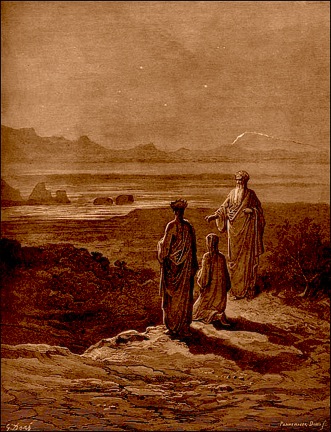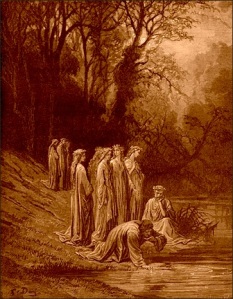
In the second canto of Dante’s Purgatory, the dour Cato interrupts a group of newcomers who have gathered to listen to someone warble a love song from his former life. Cato thunders:
“What negligence and what delay is this?
Race to the mountain and strip off the slough
Which won’t let God be manifest in you!”
Cato’s message, of course, is that the purging of sin is serious business and one shouldn’t loiter in the past, even the good past.
Perhaps Cato was aware how the Past can be all consuming and the Future so deeply intriguing that the Now shrinks to a pinpoint of significance. And when a distressing Past threatens the imminent Future, the Now can vanish altogether in a welter of worry and panic. Sometimes we find ourselves shuffling along, blind, deaf and dumb to the crucial Now, or riding the Present like a slumbering passenger on a subway, ignoring the crucial intersections clattering by, missing the doors that open and close.
Thomas Merton claimed that past and future “are not ours because they are always out of reach.” Some of us are in dire need of a Cato to remind us of the Time, that it’s Now o’clock, the moment to be doing something about what we’ve been given.
If only it were so easy. Even though the Past is not ours, it does not necessarily proceed peacefully to the corral when we want it to. Sometimes it’s the big suitcase that will not close. Sometimes it’s the glaring nail hole in the wall that the picture frame just fails to cover.

I love the symbol of the two rivers at the end of Dante’s Purgatory. Those baptized in the River Lethe forget their sins. Those who drink from the River Eunoe are blessed with the memory of righteousness, a Divine memory we didn’t know we had. Dante borrows the image of Lethe from Greek stories and Greek religious philosophy. Some Stoics believed that in the afterlife, the River Lethe washed the soul of all its memories so it could be recycled into the world. Dante appropriates it to symbolize the New Creature: “All things have passed away…” –not the typical Christian redemption symbol, but something that comes after the hard work of penance.
For Cato’s harsh reminder precedes Lethe’s blessed waters. Penance in the Now plants the Promise of the Future.
Shed, for a moment, the dogma of denomination. Forget prayer beads and bloody knees. For many, taking the Now seriously–truly seriously–is a penance of its own, a turning away from hypnotic Siren songs from before and behind. And staying there, standing fast there, may call for some pretty serious penitential work, the kind of work that overcomes the insistent tug of bitterness, anger or despair. It may require the gritty, unglamorous labor of forgiveness, patience and genuine belief, the sort of belief that walks without theatrical theme music.
We tend to idealize forgiveness because it appears so often in the teachings of Christ. It acquires a kind of halo effect that belies its real mundane and unspectacular dimensions. The divine glow makes us feel that forgiveness is the sort of thing God takes care of while we stay busy making theologically correct propositions, satisfied that our rightness has done the work of righteousness. We are like Andrew Jackson who blasted his foes: “May God forgive them, for I never shall.”
As for patience and belief, few have even a mustard seed of the former and fewer still know what the latter looks like. Our persistent sense of entitlement renders us immune to the sheer force of effort that each requires. G.K. Chesterton would have called us functional atheists–those who profess belief in the Divine but behave consistently as though there’s no such thing.

As Dante begins to climb Mt. Purgatory, he finds his forehead stamped with symbols of his wrongdoing in life. As he leaves each level behind, an angel comes and wipes a damning mark away. He runs the gamut of the Deadly Sins from Pride to Lust. The final gateway leads through fire–“for he is like a refiner’s fire,” says both the scripture and the celebrated song from Handel’s Messiah, “and who shall stand when He appeareth?”
One need not be Pelagian or Roman Catholic to embrace the need for Penance, the transforming life labor that goes far beyond the sheer repetition normally associated with the term. There is no real penance without empowerment. We have just celebrated what we call the Advent, the inception of the Incarnation of Christ. That Incarnation is the Divine Penance–not that He needed to purge Divine sin, but that we desperately needed the model whereby to purge ourselves. A great mystery rarely addressed is just how Christ handled the relentless barrage of disbelief that came to him every hour. Jesus is often presented as some kind of redemptive superhero. But he walked in dirty streets and dealt with grossly selfish people and got hammered, day in and day out, by ignorance, insult and indifference. The challenge for Christ was to avoid calling down fire from heaven and leaving smoking holes where people stood. If Righteousness was all about Being Right, Jesus could have Shown Them. But he didn’t. He worked. He took all of it and he kept right on working in the Present. And the Present of Christ extends to ours and provides the empowerment for our penance.
I don’t pretend to have reached any apotheosis here. Like Tolstoy’s Konstantin Levin, I’m always on the lookout for one of those. But for the moment, maybe for only a small window of Now, I’ll try to taste truth.

Greetings in Christ.
This advice to be present in the moment is one of the key things God is trying to get me to do right now.
Thanks for the timely reminder.
As for penance, I have this available to me as an Eastern Orthodox Christian on a regular basis. The key is, penance is offered to me by a Spiritual Father / Confessor when I participate in the Sacrament of Confession.
This is also a good reminder. Penance is not just left up to me. There is a specific time and place to find it and practice it.
Of course repentance should be constant and ongoing. Penance is reserved for when breakdowns occur and I need help to get back on the path.
Sincerely in the Blessed Trinity,
Columba Silouan
Thanks, Columba. Perhaps the non-liturgical traditions can learn something about penitent living from the liturgical ones. I appreciate the comment.